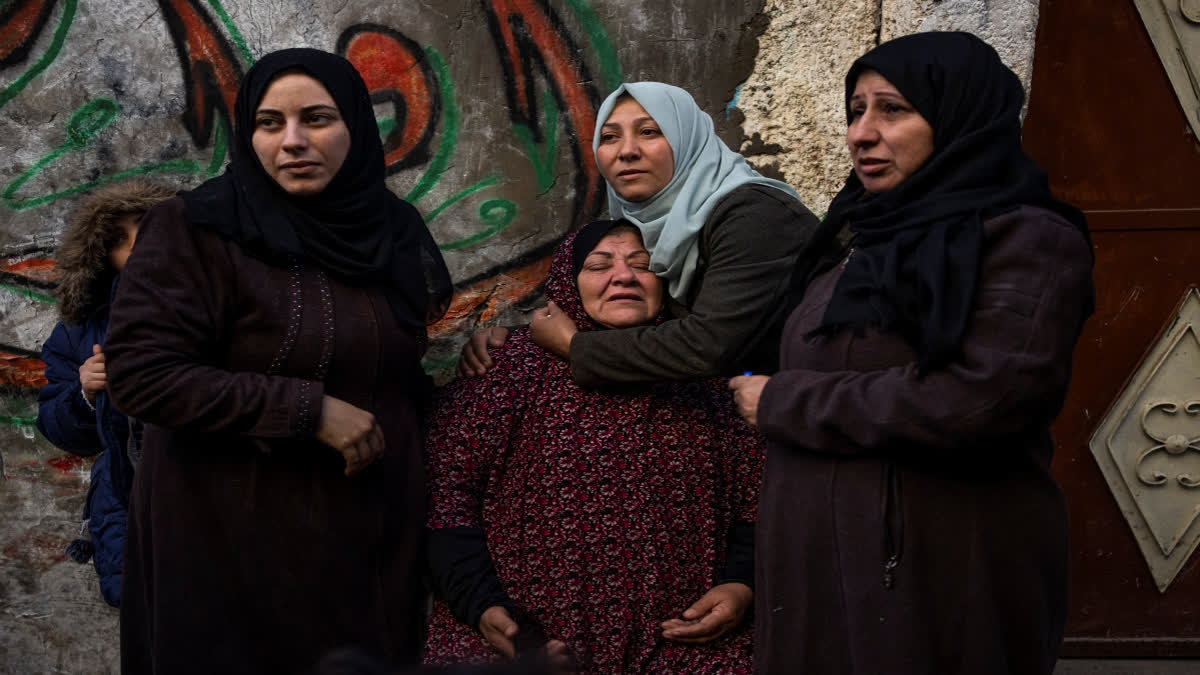Rafah (Gaza Strip): Israeli airstrikes killed at least 13 people in Rafah in the Gaza Strip after Prime Minister Benjamin Netanyahu rejected Hamas' cease-fire terms and vowed to expand the offensive into the southern Gaza town. President Joe Biden called Israel's military response in Gaza over the top and said he continues to work tirelessly to press Israel and Hamas to agree on an extended pause in fighting.
I am of the view, as you know, that the conduct of the response in the Gaza Strip has been over the top, Biden told reporters in an exchange on Thursday evening after delivering remarks on a special counsel report on his handling of classified documents. Biden has been under political pressure to mend any rifts with voters he might need, especially in the Arab American community, where he has faced increased backlash for his vocal support of Israel's war in Gaza. On Thursday, he sent emissaries to a suburb of Detroit, where the nation's largest concentration of Arab Americans resides.
More than half of the Gaza Strip's population has fled to Rafah, a city on the mostly sealed border with Egypt that is also the main entry point for humanitarian aid. Egypt has warned that any ground operation there or mass displacement across the border would undermine its 40-year-old peace treaty with Israel.
The strikes killed at least 13 people, including two women and five children, according to the Kuwaiti Hospital, which received the bodies. At the scene of one of the strikes, residents used their cellphone flashlights as they dug through the rubble with pick-axes and their bare hands. I wish we could collect their whole bodies instead of just pieces, said Mohammed Abu Habib, a neighbor who witnessed the strike.
Israel's 4-month-old air and ground offensive - among the most destructive in recent history - has killed over 27,000 Palestinians, driven most people from their homes and pushed a quarter of the population toward starvation. Netanyahu has said the offensive will continue and expand until total victory over Hamas, which started the war by launching a wide-ranging attack into southern Israel on Oct. 7 in which militants killed some 1,200 people, mostly civilians, and took around 250 hostage.
Biden has pushed for an extended pause in the fighting to facilitate the release of the remaining hostages after brief pauses earlier that had allowed for the release of mostly women and children. More than 100 are still captive and Israel has vowed to bring them back. Hamas, however, has demanded that Israel release hundreds of Palestinian prisoners and end the war as part of a hostage deal. Israel Prime Minister Benjamin Netanyahu has refused to agree to those terms.
Biden said he still is hopeful that a deal can be worked out that might create a path to ending the war. I am pushing very hard now to deal with this hostage cease-fire, Biden said. I've been working tirelessly on this deal. Israel's goals appear increasingly elusive, as Hamas reemerges in parts of northern Gaza, which was the first target of the offensive and has seen widespread destruction. Israel has only rescued one hostage, while Hamas says several have been killed in airstrikes or failed rescue missions.
ALARM GROWS AS ISRAEL EYES RAFAH
Netanyahu said preparations were underway to expand the offensive into Rafah, where hundreds of thousands of people who fled from other areas are crowded into squalid tent camps and overflowing U.N.-run shelters. The Palestinian death toll from four months of war has already reached 27,840, according to the Health Ministry in the Hamas-run territory. The ministry does not distinguish between civilians and combatants in its figures but says most of the dead were women and children. International aid organizations have warned that any major operation in Rafah would compound what is already a humanitarian catastrophe.
If they aren't killed in the fighting, Palestinian children, women and men will be at risk of dying by starvation or disease. said Bob Kitchen, of the International Rescue Committee. There will no longer be a single safe' area for Palestinians to go to. Outside the hospital where bodies from the overnight strikes were brought, relatives wept as they said farewell to their loved ones. Warda Abu Warda said she felt helpless. Where do we go after Rafah? Do we go to sea? she asked.
GAPS REMAIN IN TALKS OVER CEASE-FIRE AND HOSTAGE RELEASE
The United States, Qatar and Egypt are trying to broker another cease-fire agreement to ensure the release of the remaining hostages. But Hamas has demanded an end to the war, a full Israeli withdrawal from Gaza and the release of hundreds of Palestinian prisoners, including high-profile militants. Netanyahu rejected those demands as delusional on Tuesday and said Israel would never agree to any deal that leaves Hamas in partial or full control of the territory it has ruled since 2007.
But visiting Secretary of State Antony Blinken said an agreement was still possible and that negotiations would continue, the latest sign of a growing divide between the two close allies on the way forward. A Hamas delegation arrived in Cairo on Thursday for more negotiations. Netanyahu is under mounting pressure from families of the hostages and the wider public to bring them home, even if it requires a deal with Hamas. At least one senior Israeli official has acknowledged that saving the captives and destroying Hamas might be incompatible.
Hamas is still holding over 130 hostages, but around 30 of them are believed to be dead, with the vast majority killed on Oct. 7. The group is widely believed to be holding the captives in tunnels deep underground and using them as human shields for its top leaders.
Read More



